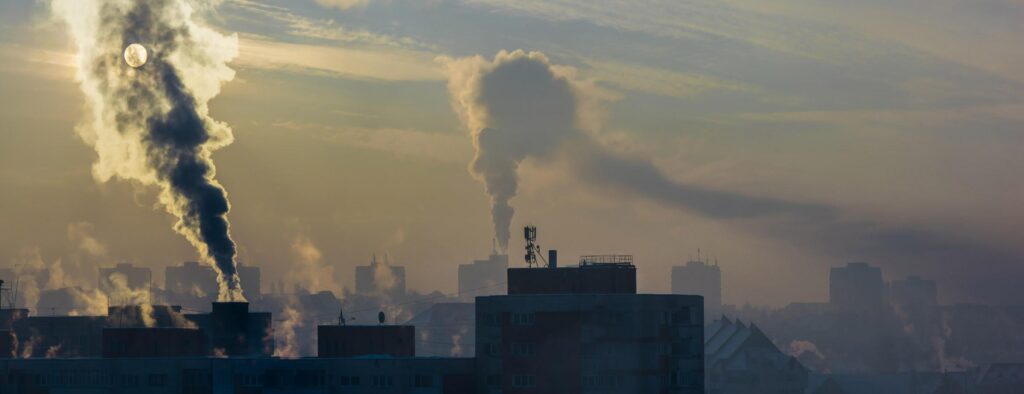
About 141 million Americans live with unhealthy levels of air pollution according to the American Lung Association’s annual “State of the Air” report. This report covers the two most prevalent kinds of air pollution that plague our nation: smog (also known as ground-level ozone) and soot (technically known as “particulate matter”).
There are great health risks associated with constant exposure to smog and soot, such as asthma attacks, lung cancer, and cardiovascular damage which can all lead to a premature death. There are also risks for reproductive and developmental harm to unborn children and infants. The effects of smog and soot are dangerous in their own unique ways, so let’s break them down.
What is Smog?
Smog is defined as a severe air pollution. The term comes from the early 20th century as a contraction of two words “smoke” and “fog,” a reference to the smoky fog in both its opacity and odor. It is a visible pollution that is generally made from combustion emissions. Offenders on this list include motor vehicles (air crafts included), industrial coal emissions, and naturally occurring agricultural fires.
Smog is never good, but it is often unhealthier during the summer. On warm, sunny days smog is worsened by the emissions that exit motor vehicle tailpipes, and in some places, by industrial smokestacks. The warm temperature makes the ground-level ozone more likely to form. Conversely, in the winter more people are burning fires and utilizing coal plants to heat their homes which directly increases smog levels.
What is Soot?
Of the two, soot is far deadlier and more of a health hazard than smog. It causes more cases of lung cancer and premature death according to the American Lung Association. Soot is defined as a mass of impure carbon particles that result from the incomplete combustion of organic compounds (hydrocarbons to be specific). In layman’s terms, soot is the tiny particulate matter that is floating in the air as a result of a fire. Soot is also commonly known as “Black Smoke.”
Health Effects and Human Behavior
Emerging studies show that air pollution from smog and soot is linked to mental health problems, impaired judgment, poorer performance in school and work, and most scary perhaps, higher levels of crime such as murder. That last point sounds a bit eccentric, but science says otherwise. Let’s dive in.
A terrifying statistic from the World Health Organization states that nine out of ten people on earth consistently breathe in dangerous levels of polluted air. This fact makes it easy to understand why we have so many cases of cancer and premature death, but how does that affect crime rates, especially murder rates? According to researcher Jackson Lu of the Massachusetts Institute of Technology and his 2018 research team, air pollution predicted six major categories of crime, including manslaughter, rape, robbery grand theft auto and assault.
This conclusion was made after examining nine years of data on the entire United States and found that the cities with the highest levels of pollution also had the highest crime rates. It was also found that people living in heavily polluted environments experienced increased levels of anxiety and aggressiveness.
Criminal activity and behavior are not the only thing that a polluted environment brings. In early 2019, a study led by Joanne Newbury of King’s College in London showed that teenagers exposed to toxic, polluted air are at a higher risk of psychotic episodes and paranoia.
There was also evidence to suggest that high levels of pollution can damage the brain structure, specifically the prefrontal lobe which is responsible for controlling our base impulses and executive function. Less dramatic effects come in the form of increased aggression, irritability, and poorer cognitive performance which can affect the work environment in a detrimental way.
The Future is Filtration
According to the World Health Organization, air pollution is the biggest environmental risk to health. Countries from all over the world are attempting unique and innovative ways to tackle this pollution problem. In 2014, China declared a “war against pollution” and began testing large-scale, public air filters such as the “Smog Free Tower” in Beijing, which can clear the pollution from an area as big as a soccer field.
Other countries have begun constructing and or covering large buildings in a material that can convert pollutants in the air into a harmless salt that is washed away by the rain. Countries across the world are also beginning to change their laws and regulations regarding pollution and required filtration for the betterment of their citizens.
We can all do our Part
While the problem overall seems insurmountable, there are definite steps you can take to improve the quality of the air around you. Purchasing an air filtration device such as HEPA filter for your home or office will immediately improve your personal air quality. Make sure to clean or change the filter regularly in order to keep the device running at its peak performance.
If you are employed in an office setting, it is critical to know what is being done about the air in your environment. If you are unsure of what your company does to filter the air in your work environment, don’t be afraid to ask! Most companies are required to meet specific air quality standards for their employees, but it is up to you to make sure that your company is actually doing their part.
For employers, it is imperative to provide a clean air environment to your employees. As we learned above, poor air quality can lead to poor performance, lower cognitive levels and even increased rates of hostility and crime, none of which are good for any business.
Bad air can also increase your company’s medical insurance and time off taken by sick employees who are suffering from ailments caused by poor air quality. Poor air quality can also interfere with industrial machinery and cause workflow issues or production delays. Investing in a quality industrial air filter is the first and best place to start when protecting your office environment and your employees.

Advanced Filtration Concepts is a
Certified Veteran-Owned Small Business.
